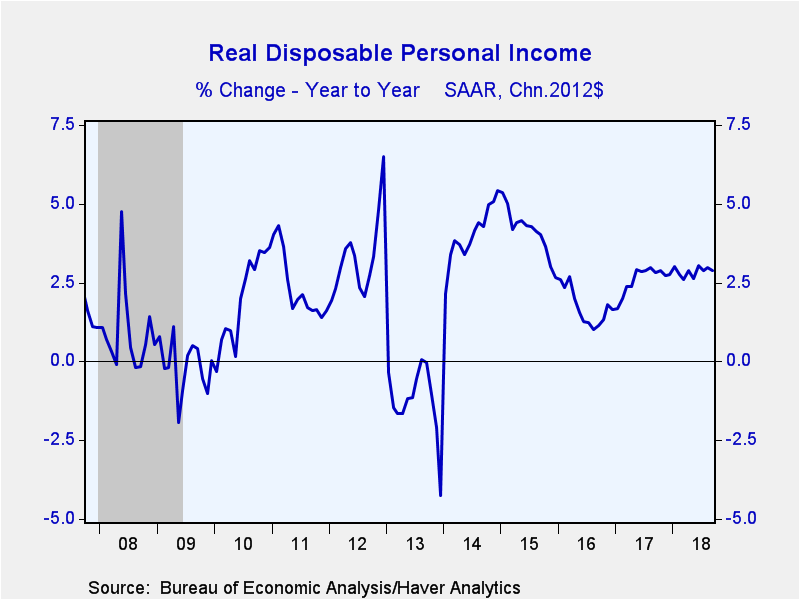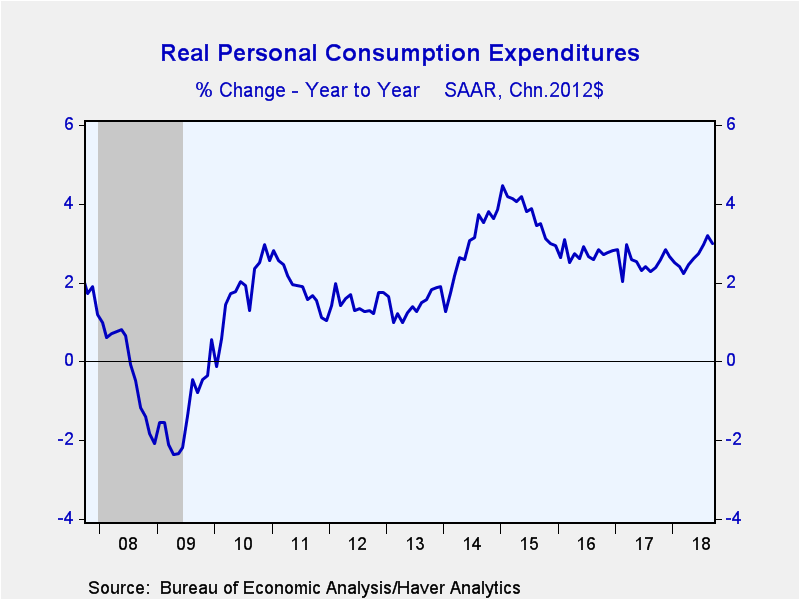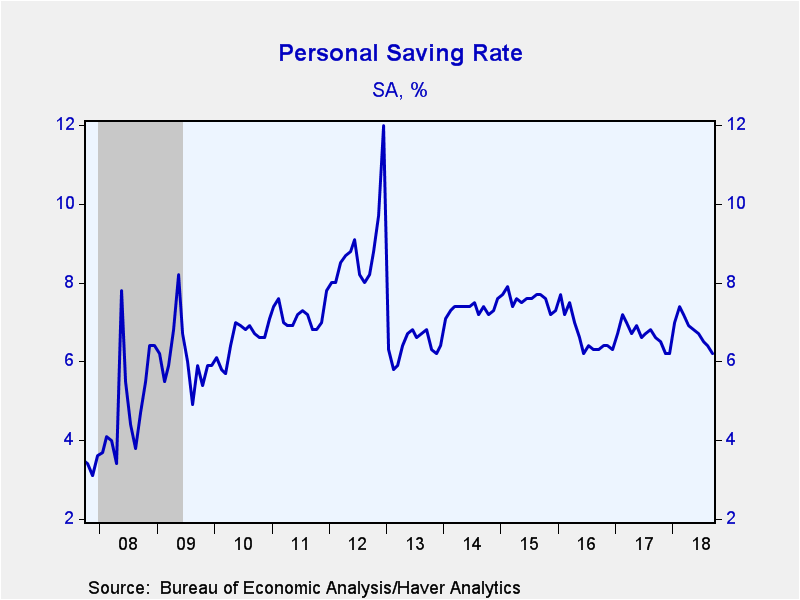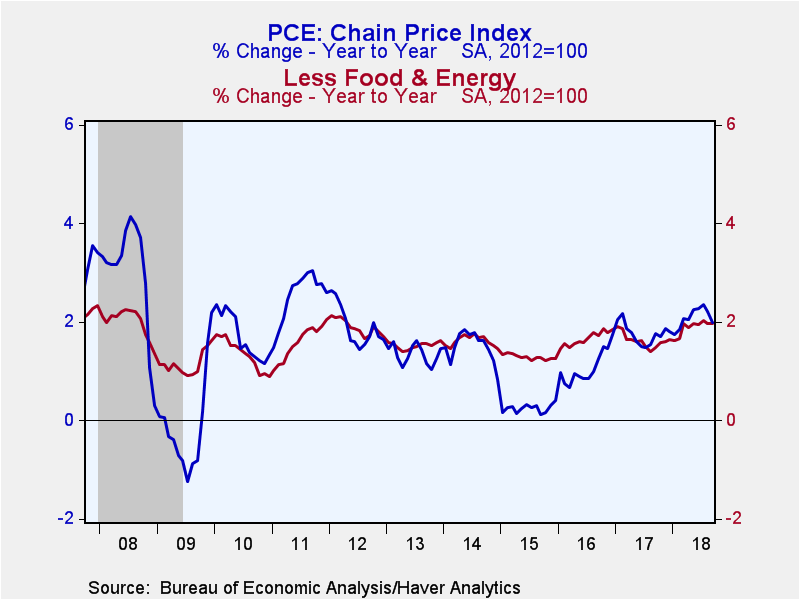 Global| Oct 29 2018
Global| Oct 29 2018U.S. Personal Income Increase Lags Gain in Spending
by:Tom Moeller
|in:Economy in Brief
Summary
Personal income rose 0.2% (4.4% y/y) during September following a 0.4% August increase, revised from 0.3%. A 0.4% gain was expected in the Action Economics Forecast Survey. Leading last month's weaker rise was proprietors' income [...]
Personal income rose 0.2% (4.4% y/y) during September following a 0.4% August increase, revised from 0.3%. A 0.4% gain was expected in the Action Economics Forecast Survey. Leading last month's weaker rise was proprietors' income which fell 0.8% (+3.8% y/y) following two months of 0.3% increase. Diminished growth of 0.2% (4.6% y/y) in wages & salaries added to the slowdown as it followed a 0.5% gain. It was the weakest rise since October of last year. Income from assets notched 0.1% higher (5.3 y/y) for the second straight month. It reflected a dividend increase of 0.2% (3.4% y/y) and a 0.1% uptick (6.7% y/y) in interest income. Showing improvement was rental income which jumped 0.9% m/m (5.0% y/y), its largest monthly gain since January of last year.
Personal consumption expenditures rose 0.4% last month (5.5% y/y) after a 0.5% increase, revised from 0.3%. A 0.4% improvement had been expected. A 1.4% jump (4.7% y/y) in spending on durable goods led last month's rise as it followed a 0.6% gain. It was powered by a 2.3% increase (2.1% y/y) in purchases of motor vehicles and a 1.7% (7.0% y/y) strengthening in recreational goods & vehicles buying. Home furnishings & appliance spending gained a lessened 0.3% (5.7% y/y). Purchases of nondurable goods improved 0.3% (4.7% y/y). The dollar amount of spending on gasoline & other energy products was unchanged (9.5% y/y). Purchases of clothing rose 0.4% (4.7% y/y) after a 1.4% decline and spending on food & beverages increased 0.2% (3.8% y/y). Services outlays improved 0.3% (5.2% y/y), the weakest rise in seven months. Spending on housing & utilities rose 0.4% (4.8% y/y) as did health care outlays (4.6% y/y). Recreation services spending ticked just 0.1% higher (2.7% y/y) while spending at restaurants declined 1.4% (+5.5% y/y).
The personal savings rate eased to 6.2% from 6.4%. It has been falling steadily since the February high of 7.4%. The level of personal savings fell 0.2% y/y.
The personal consumption chain price index inched 0.1% higher (2.0% y/y) for the fourth straight month. The durable goods price index fell 0.4% (-1.6% y/y), down for the sixth month this year. Motor vehicle prices were off 0.8% (-0.3 y/y). The nondurable goods price index gained 0.1% (1.4% y/y). Clothing prices increased 1.1% (-0.3% y/y) following a 1.6% decline. Services prices rose 0.2% (2.7% y/y) for the fifth month in the last six. Health care costs improved 0.1% (1.9% y/y).
The personal income and consumption figures are available in Haver's USECON database with detail in the USNA database. The Action Economics figures are in the AS1REPNA database.
| Personal Income & Outlays (%) | Sep | Aug | Jul | Sep Y/Y | 2017 | 2016 | 2015 |
|---|---|---|---|---|---|---|---|
| Personal Income | 0.2 | 0.4 | 0.3 | 4.4 | 4.4 | 2.6 | 4.9 |
| Wages & Salaries | 0.2 | 0.5 | 0.3 | 4.6 | 4.6 | 2.9 | 5.1 |
| Disposable Personal Income | 0.2 | 0.4 | 0.3 | 4.9 | 4.4 | 2.8 | 4.4 |
| Personal Consumption Expenditures | 0.4 | 0.5 | 0.5 | 5.0 | 4.3 | 3.8 | 4.0 |
| Personal Saving Rate | 6.2 | 6.4 | 6.5 | 6.6 (Sep'17) |
6.7 | 6.7 | 7.6 |
| PCE Chain Price Index | 0.1 | 0.1 | 0.1 | 2.0 | 1.8 | 1.1 | 0.3 |
| Less Food & Energy | 0.2 | 0.0 | 0.2 | 2.0 | 1.6 | 1.7 | 1.3 |
| Real Disposable Income | 0.1 | 0.2 | 0.2 | 2.9 | 2.6 | 1.7 | 4.1 |
| Real Personal Consumption Expenditures | 0.3 | 0.4 | 0.3 | 3.0 | 2.5 | 2.7 | 3.7 |
Tom Moeller
AuthorMore in Author Profile »Prior to joining Haver Analytics in 2000, Mr. Moeller worked as the Economist at Chancellor Capital Management from 1985 to 1999. There, he developed comprehensive economic forecasts and interpreted economic data for equity and fixed income portfolio managers. Also at Chancellor, Mr. Moeller worked as an equity analyst and was responsible for researching and rating companies in the economically sensitive automobile and housing industries for investment in Chancellor’s equity portfolio. Prior to joining Chancellor, Mr. Moeller was an Economist at Citibank from 1979 to 1984. He also analyzed pricing behavior in the metals industry for the Council on Wage and Price Stability in Washington, D.C. In 1999, Mr. Moeller received the award for most accurate forecast from the Forecasters' Club of New York. From 1990 to 1992 he was President of the New York Association for Business Economists. Mr. Moeller earned an M.B.A. in Finance from Fordham University, where he graduated in 1987. He holds a Bachelor of Arts in Economics from George Washington University.
More Economy in Brief
 Global| Feb 05 2026
Global| Feb 05 2026Charts of the Week: Balanced Policy, Resilient Data and AI Narratives
by:Andrew Cates










